Displaying items by tag: Peter Malone's Movie Reviews
Bastarden/ The Promised Land
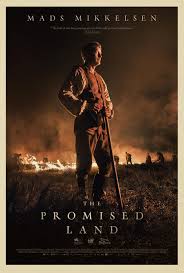
THE PROMISED LAND/ BASTARDEN
Denmark, 2023, 127 minutes, Colour.
Mads Mikkelson, Amanda Collin, Simon Bennebjerg, Melina Hagberg, Kristine Kujath Thorp.
Directed by Nikolaj Arcel.
A recommendation for audiences who enjoy re-creations of history. We are taken back to the middle of the 18th century, 1755, Denmark, and out into the barren heaths of Jutland (the territory, 100 years later, for Babette’s Feast).
The title is one of hope, the story of a veteran Danish soldier, Ludwig Kahlen, serving in Germany 25 years, in civil status, the illegitimate son of a landlord who offloaded him to the military, now returning and requesting permission to cultivate the barren land, a movement supported by the King who wants to develop this neglected area with settlers and commerce, but not backed enthusiastically by his counsel.
Which means that this is the dramatic struggle of a determined individual to work against all odds, even to digging the soil with his own hands, trying to get support, a vision of success – and even hoping for royal acknowledgement and nobility status. But we realise that this will entail a steadfast determination, struggles with the land, with the climate, with the need for financial and co-working assistance.
And, that is what we are given, and more.
The cinematography of the landscapes contrasting with the courts, the lavish mansion of the local landowner, enhances the atmosphere. And the performances are very strong. Mads Mikkelson has proven himself in Danish cinema as well as internationally. This is one of his best performances – and he had worked with the director, Nikolaj Arcel, in A Royal Wedding (2012), a drama set a decade later than this film but focusing on Denmark’s Royal family. (The screenplay was written by Anders Thomas Jensen who has collaborated with Arcel and Mikkelson in several projects including the striking Riders of Justice.)
While the development of a promised land as the focus, the human stories interwoven are quite compelling. On the dramatic, evil side, there is the manic, narcissistic and exploitative landowner, de Schinkel (Simon Bennebjerg, absolutely convincing as a brutally insane predator), his cousin, Edel, attracted to Kahlen and key to a violent resolution, and a runaway servant, Ann Barbara, who settles with her husband in working with Kahlen, with violent consequences as well. The local outlaws who work for a time but then are frightened off, German settlers, but, especially, a dark complexioned young girl, a “darkling” whom the Germans fear is a bad omen, Anmai Mus, Melina Hagberg in her only role us far, bringing a cheeky and challenging presence but also a deeply humanising perspective to the drama.
The English title focuses on the land. The Danish title focuses on Kahlen but cannot be used in English because of its derogatory overtones – but the director has commented “in Danish, the bastard only means illegitimate son or illegitimate child. It actually doesn't mean anything sort of other negative than that:.
An immersion in Danish history.
- The title, English and the land, Danish and status?
- Immersion in Danish history? 18th century, 1755-63, the King and Council, Jutland and barren land, development? Political themes? Aristocracy themes? Development themes? Human themes?
- The cinematography, the landscapes, the seasons, the work on the heath, the mansion, aristocratic celebrations, the growing crops, the fight sequences? The musical score?
- The story of Ludvig Kahlen, Mads Mikkelsen’s performance?, To the military, 25 years in Germany, return, request about the land, potatoes, hearing by the Council, there disdain, expecting him to fail, it fulfilling the King’s wishes for development in Jutland? His request for finance, nobility status?
- Kahlen as a character, personality, determined, military? The encounter with Johannes and Ann Barbara, is fleeing Schinkel, taking refuge with him, their work? The episode with the little girl, begging, the attack? Her later returning, her character, language, dark complexion, the status with the exiled group? The outlaws and their attitude?
- The plan, Kahlen and his digging, testing the soil? The young minister and his working, support? Hope for workers, the approach to the outlaws, tough bargaining, their arrival, later being warned off and leaving? Little girl, wanting to stay, being taken in?
- The ownership of the land, by the King, by de Schinkel, his claims, his staff, his attitudes, the gradual revelation of his brutality, predator with the women, absolute arrogance? The meetings with Kahlen, attempts to bargain, the threats?
- The encounter with the cousin, her attraction, the handkerchief, Kahlen’s response? The invitation to the dance? Ann Barbara mending his coat, self-conscious, de Schinkel and the change of wig, the meeting with Edel, the capture of Johannes, the lashing, the hole, the boiling water, his death, the choir singing, their stopping, de Schinkel and his glee, Kahlen taking the body away, the return, the response of Ann Barbara?
- The continued hostilities, de Schinkel and his visits, wanting contracts, percentages? His getting his men to frighten away the outlaws? The arrival of the Germans, procuring the cartload of prisoners, their camp, Kahlen and the Germans attacking, the survival of de Schinke’’s military aid, his witness to Kahlen killing officer, the arrest, the lashing, the boiling water?
- The household, Ann Barbara, the Minister, the young girl, the working in the fields, the clearing, the sewing, the seasons, folded the winter, the goat milk, the young girl and her health, the killing of the goat, the meat? The arrival of de Schinkel, the leftovers from Christmas, the money, Kahlen returning it? First shoot, the frost uncovering the crop?
- The court, the report of the potatoes, the 80 bags, the reaction? The reaction of the King?
- De Schinkel summoning the locals, owners, the enmities, their banding together? The impact for the court?
- The ultimatum, the need for the young girl to leave, Ann Barbara’s reaction, leaving? Kahlen and his final talk with her, her going to the orphanage? Her reaction? Her seeing Kahlen as a father figure, his teaching her to read, to measure, to work with animals?
- Edel, de Schinkel wanting to marry her, her resistance? Seeing Ann Barbara, the drink and the poison, her promise to de Schinkel, his drinking, his reactions, collapse, Ann Barbara and her slashing him, the blood, her arrest, being taken away, life imprisonment?
- Years passing, the young girl growing up, the travelling workers, her working with the leader, the attraction, going out with him? His proposal, the symbol of the stick, Kahlen and his accepting the stick from her and her becoming part of the family, his agreeing that she should take her suitor’s stick, leaving?
- Kahlen, receiving the honours, surveyor, the nobility, but his being by himself, Ann Barbara in prison, his decision to leave everything, lose his title, a glimpse of the broken shackles, travelling with Ann Barbara…?
Jumbo/2020
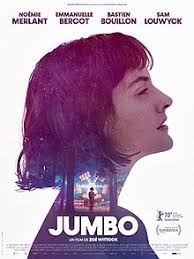
JUMBO
France/Belgium, 2020, 93 minutes, Colour.
Noemie Merland, Emmanuelle Bercot, Bastien Bouillon, Sam Louwyck.
Directed by Zoe Wittock.
An arresting title for an unusual film. Audiences generally associate Jumbo with elephants. This time, not exactly.
This is very much a women’s film, female writer-director, focus on female characters and their issues. While there are some male characters, they are not at the centre.
However, at the centre, is a young woman, Jeanne, living with her mother, who serves in a bar, and flirts with all and sundry. But she does bond strongly with her daughter. Jeanne is scoffed at by some of the young men of the town.
Jeanne goes to work at a theme park which is about to close down for the season, doing all kinds of cleaning and maintenance jobs. She becomes absorbed with the giant wheel that is core to the park, attracted to it, its size, its power, cleaning the various knobs and polishing them, seeing the lights come on. The giant wheel is called Jumbo. And she becomes more and more preoccupied.
For those coming upon Jumbo without any background, surprised, taken aback, discovering that Jeanne falls in love with Jumbo, the screenplay elaborating the language of love, visits, embraces, spending more and more time, the erotic aspects. The screenplay also focuses on the response of her mother, the manager of the fair, a young man the mother wants to set up with Jeanne, the attempts, his being rejected. The other male character in the film is a customer at the bar, a wanderer, who takes up with the mother, he is the one who has the most sympathy and understanding for Jeanne.
There are not many films about obsessions like this, many audiences being puzzled, fascinated, wondering about Jeanne and her emotions, her mental health, the consequences of the passion of love for Jumbo.
Convert, The
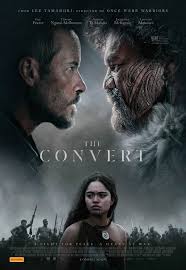
THE CONVERT
New Zealand, 2023, 119 minutes, Colour.
Guy Pearce, Tioreore Ngati-Melbourne, Antonio Te Maioha, Jacqueline McKenzie, Lawrence Makoare, Dean O'Gorman.
Directed by Lee Tamahori.
The Convert is a powerful film in itself, taking its audiences back into New Zealand, the 1830s. As such, it is a significant historical drama.
But, it takes its place in the trilogy of films over a period of 30 years by writer-director, Lee Tamahori. In 1995, he surprised audiences in New Zealand and around the world with a powerful drama of urban Maoris, violence, the consequences of colonial prejudices on people with powerful cultural and religious inheritance. In the title, there was a rueful tone in remembering past history, that they were Warriors. The second film in the trilogy, 2016, The Patriarch, Mahana, going back to the New Zealand in the 1960s, transition into the more modern era, from the strong tribal traditions into more settled situations. And, with The Convert, he goes back to the era when the Maori people were Warriors.
The film opens at sea, a vivid storm, death and funeral at sea, the atmosphere of travellers and the dangers of the period. On board is a lay minister, Thomas Munro, a fine and restrained performance from Guy Pearce. He is to be the preacher, organised by the British settlers on the West Coast of New Zealand, trying to establish something of England in the antipodes, formal clothes, church, stores, and a superior attitude towards the Maori peoples.
The film also introduces quite a fierce Maori leader and his tribe, some visual violence, and the belief that feuds are solved only by death rather than peace. This has an impact on Thomas Munro and the screenplay gradually reveals that he was a soldier, involved in fighting and killing and has turned his back on that.
While there is a picture of life in the early settlement the new settlers actually renting land from the Maoris the focus then turns on possibility of peace between the warring tribes, Munro trying to negotiate with each leader, a fierce battle between them, one mightily defeated, the other embracing peace (and stating acceptance of Christianity because of Munro’s work for peace).
The last part of the film takes place four years later, some presumptuous British officials trying to put order into the settlements, rent, Customs and Excise, business interests. And, in 1840, the Treaty of Waitangi was signed, British governor for New Zealand, and the status for the Maoris.
There is a very strong supporting cast, all Maori performances and, as a woman shown by the white society for having lived with the Maoris, the presence of Jacqueline McKenzie.
- The title, reference to Thomas Munro and his alliance with the Maori tribes? The tribal leader and his acceptance of Christianity because of the peace treaty?
- The work of the writer-director, his trilogy about New Zealand, Maori traditions, violence and the later 20th century, family in the mid-20th century, this film in the 1830s? The Maori wars?
- The cinematography, the opening in the mountains, the bird of prey swooping, the forest scenery, the sea, the coast and beaches, the new town and its buildings, the battle sites? The musical score?
- The opening, the ship, 1830, sails, the storms and waves, the dead sailor, the ritual, Thomas Munro and his words? Coming ashore, the need for repairs, the rule of the Captain, the crew, the captain and his speaking the Maori language, communicating, the encounter with the chief and the tribe, the execution of the man, the saving of the woman?
- Thomas Munro, quiet personality, lay preacher, arriving in the town, the contract to have him, the church building? The gradual revelation of his past, home life, in the Army, the narrative about the attack in the smoke, the deaths of the women and children, the school? His leaving the Army, changing his life? From London to the New Zealand settlement? Intentions for a ministry, the reality of what happened?
- The settlement, the re-creation of life in England, formal clothes, hierarchy of officials, the church, the attitude towards the Maoris, renting the land? The holding of the dance, Munro going with the wife, her dresses? Daily life, church service, the Catholic storekeeper and his bitterness, wanting to return to Ireland?
- Thomas, the young wife, her grief, her father and tribal customs, enmity towards the other tribe? Allowing Thomas to take her, the young man for protection? The young woman in the town, an eye on him, visiting him, the relationship? The night of the dance, the killing of the young man? The blaming of the shopkeeper, arrest, violence towards him, his hanging himself, allegedly?
- Mrs Hegarty, her story, theft, but Botany Bay, marriage, New Zealand, with the Maoris, not accepted? Her healing skills? Helping the young woman to health? Treatment by the townspeople? The friendship with Thomas, the development of the relationship? Supporting Thomas and the battle, the dangers, her death?
- The return of the ship, supplying of muskets, negotiating with each of the tribal leaders, the prices, playing off each other, the Captain shot, the members of the crew?
- The buildup of the tensions between the two tribes, Thomas and his idea of peace, talking with each of the leaders, the Maori belief that feuds ended with deaths, the buildup to the confrontation, the violent fighting? The guns, target practice, the wife and her gun, using it? The strategies of the lesser tribe, preparation for the assault, the trenches, the attack? The leader and his being stranded on the beach, his death?
- The possibilities for peace? The dangers for Thomas, with the wife, on the beach, his being willing to die? He is serving as a mediator?
- The years passing, the settlement growing, the inhabitants, the arrival of the king’s representatives, the issue of rent, Customs and Excise, Thomas and his taking a stance for the Maoris?
- The 1830s, the 1840 treaty of Waitangi? And subsequent history, colonialism, racial prejudices, the developments of the 20th century?.
Despicable Me 3
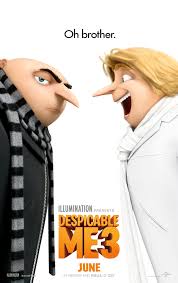
DESPICABLE ME 3
US, 2017, 90 minutes, Colour.
Voices: Steve Carrell, Kristin Wiig, Trey Parker, Julie Andrews, Steve Coogan, Pierre Coffin, Jenny Slate.
Directed by Kyle Balda, Pierre Coffin.
If you have been following the career of intense mastermind criminal, Gru, as well as his conversion to the side of right, and also his devotion to agent, Lucy, then there is no doubt that you will want to see what they are up to in this third Despicable Me film.
And, of course, of course, there are the Minions, still with their bright yellow, still some of them with a touch of personality while there are hosts of almost anonymous others, with their particular intonations and language which we scarcely understand, and their propensity for being on the side of those against the law. The animation is the same and it has delighted audiences, especially younger audiences, in the previous two films and the Minions’ own feature and short films.
While there could have been more of the Minions in this film, they turn up at various times, bringing a sense of comic relief, in their turning against Gru because of his law-abiding missions, rounded up and going to prison and causing more than a rumpus there, escaping and flying through the air in their own contraption and able to help out in final confrontations. Steve Carrell voices again the character of Gru, and Kristin Wiig is Lucy.
If you have seen the trailer, then you won’t be surprised that one of the plot developments is the introduction of a villain par excellence, Balthasar Bratt (voiced by Trey Parker of South Park), a superstar child of 1980s television, a young successful criminal. After a bout of acne, he loses popularity and decides to retire to be a criminal in real life, seeming to have unlimited funds (probably his royalties) to create robots, planes, weapons. Gru has a mission to capture Bratt but just misses out so he is fired from the agency as is Lucy when she stands up for him. They retire to home with their three daughters and all seems to move towards a quiet film.
But, then comes the news that Gru has a twin brother, Dru (also voiced by Steve Carrell but in a higher register), so Gru contacts his making whoopee mother (voiced by, of all people, Julie Andrews!) who tells him the truth and he goes to find his long-lost brother who has yellow hair while Gru has none. The whole family moves into Dru’s luxurious home. But, Bratt is not to be put down and has stolen a jewel from Paris – which means, of course, that Gru will be after him again, with the help of Dru (who actually wants to be a criminal). So, finally, plenty of action as Bratt takes his plane and then his giant robot of himself and laser in a pretty successful attempt to demolish a lot of Hollywood, only to be defeated by Dru – and the Minions coming to the rescue.
And there it is, more or less what we might expect, a lively entertainment, especially for younger audiences.
Sixth Commandment, The
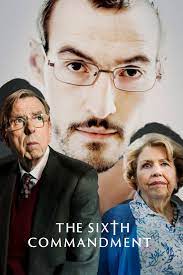
THE SIXTH COMMANDMENT
UK, 2023, 4 X 60 minutes, Colour.
Eanna Hardwicke, Timothy Spall, Anne Reid, Connor MacNeil, Adrian Rawlins, Amanda Root, Sheila Hancock.
Directed by Saul Dibb.
The Sixth Commandment is based on an actual case, that of Ben Field, initially making a very good impression, charming, befriending lonely people, caring for them, but all the time sociopathic behaviour, narcissistic, exploiting those whom he befriended, is one changing their wills, his medicating them, their deaths. Ultimately, the cases were investigated, Ben Field arrested, charged, found guilty.
This is a powerful recreation of two of the stories, Timothy Spall excellent as Peter, a lonely gay academic, and Anne read as Anne, lonely, Ben befriending her, manipulating her, responsible for her death.
While the supporting cast are very effective, the focus is on Eanna Hardwicke as Ben Field, a tour de force performance, always convincing, Connor MacNeil appears as Martin, the young man, also manipulated by Field.
The first episode tells Peter’s story, the second the story of Anne. The third episode shows the police investigations. The fourth episode has Ben Field in court.
Series was written by Sarah Phelps, BBC writer, responsible for several adaptations of Agatha Christie (including the strange ABC Murders with Poirot, played by John Malkovich, revealed to be a priest). The series was directed by Saul Dibb (The Duchess, Journey’s End, Suite Francaise).
A series to be recommended.
- Based on actual facts? Miniseries treatment?
- The title, the commandment rhyming with thrill? Kill?
- The setting of the English village, homes, school, church, the police, the courts? The musical score?
- Peter’s story, the performance by Timothy Spall, Peter’s life, age, living alone, quietly gay, the Internet and porn, his loneliness, going to the school, his speech and acclaim, his writing novels, keeping extensive diaries? Classes, Martin present, Ben arriving, almost taking over after being late, the quotes? The friendship with Ben, in class, his style, sharing with Peter, the visits, the walks, the mountain, the declaration of love, his continued care, Peter’s novel, Martin coming as a boarder, arranging the printing of the novel, the launch, Peter’s medical condition, Ben’s continued treatment, Ben and his concern, audience suspicions? Peter’s erratic behaviour, hospital, drinking, his death, the sadness? Ben and his eulogy in the church?
- Peter’s brother and his wife, the bonds with Peter, their concern, the visits, believing Ben?
- Anne’s story, neighbour to Peter, her dog in the street? Ben, friendly, the attack and their talking, his flattering her? her age, life and career, alone? Her niece and the visits, the family? Ben, growing friendship, moving in, the religious dimension, his alleged studies for priesthood, wearing the vestments in the house, giving communion? The messages on the mirror? Her medication, changing her will? The lease, busy, the phone calls? Anne and her illness, the institution, the discussions, Ben and his eulogy?
- The focus on the investigations, the police and their personalities, the detectives, the chief detective taking over? Anne’s niece, the interrogations, the growing focus on Ben? Background to Ben Peter, Ian and his wife? The issue of the diaries, the search, and having taken some? Looking for clues? The persistent officer examining the documents? The charges? Ben getting out, his continued politeness, Martin and his fear, Ben controlling him?
- The court, the detectives and their evidence, collecting the evidence, Ian and his wife, collaboration, Anne’s niece and her husband, disruption to her family life? Ben, acting the part, seeing him in flashbacks, his words, as defence that he was literary, imaginative, writing down the words rather than action? The rap themes, his denials?
- The reconstruction of the death sequences and their impact?
- The jury, Martin released, Ben guilty, Ian and his wife, reaction, 26’s niece?
- The portrait of a psychotic, sociopath, charm, narcissistic, the evil that he brought on innocent people, exploitation?
Znachor/ Forgotten Love
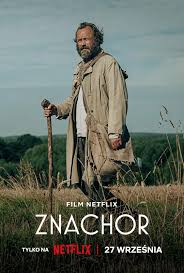
FORGOTTEN LOVE/ ZNACHOR
Poland, 2023, 140 minutes, Colour.
Leszek Lichota, Maria Kopwalska, Ignacy Liss, Anna Szymanczyk.
Directed by Michal Gazda.
This story began its life as a screenplay in 1937, becoming a novel, a film version in 1938, a film version in 1982, this present version 2023. The Polish title is Znachor, indicating an unlicensed doctor, The Quack, the title of the 1982 film and of the novel.
This is a moving story about amnesia. In English-language films, the classic amnesia film is the 1942 Random Harvest with Ronald Colman and Greer Garson. There are many parallels with this story.
The central character is a celebrated doctor, very skilful as is seen in surgery, caring for the poor, not ambitious, contrasting with his friend who is expecting to be put in charge. However, his own life, his wife abandons him, taking his beloved young daughter out into the Polish countryside.
A young paperboy is hurt in an accident, the doctor saving him with intricate surgery, receiving a great deal of acclaim, and the setting up of surgical services for the poor. As a result, he is acclaimed and put in charge – to the anger of his friend, now a rival. The doctor becomes a victim of a mugging, his friend abandoning him, an opinion going around that he killed himself because of his wife and daughters’ departure. This is 1920.
The film moves forward 15 years, discovering the doctor with amnesia, calling himself Antoni, a vagrant, surviving hand to mouth, often in jail. A situation arises where he helps a man with a dislocated shoulder, his abilities coming back to him but he does not know where they are from. He is welcomed in the town, a huge clientele coming to him even though he is not licensed.
The other strand of the plot is his daughter, her parents dying, coming to the town, intending to study at having to raise money by working in the Jewish Tavern. She encounters a young count, brash and his treatment, but apologising, and a romance actually blossoming despite his snobbishly aristocratic mother. A jealous man cuts the brake on his bike and the couple crash and are severely injured, the young count being sent to Switzerland for recovery, the young woman needing surgery and Antoni persuaded to do this, his companion having stolen the doctor’s implements.
This is a very emotional film, in his daughter’s not recognising her father and suspicions of him as a quack, her injuries, recovery, gratitude, the complexities of the relationship with the count. Antoni is arrested and charged but, the plot proves rather quickly so that the daughter is able to identify her father with the aid of the count, and interaction of the court case – and very happy with the ending.
The film was directed by Michal Gadza who has directed many television series including a version of Harlan Coban’s Hold Tight.
- The title, the focus on love, the focus on forgetting, a film of amnesia?
- The 21st century version of an old story, previous film treatments? A Polish story?
- The setting, Poland in the early 20th century, the early sequences in 1920? Later sequences in the mid-30s? Costumes and decor, city life, country life? The musical score, Polish songs, and the cinema?
- The introduction to Dr Wilczur, the hospital, the surgery, his reputation? His family background, the scenes at home, with his wife, her distance? Love for his daughter, the scene of sewing the heart on her teddy bear? His wife leaving him, abandoning him, taking her daughter? The relationship with his friend, his friend’s ambition to head the Department, their discussions?
- The couple walking, talking ambitions, the newspaper article, the doctor wanting more copies, sending the little boy, dropping the papers, run down, Dr Wilczur and his response, the surgery, the recovery?
- Dr Wilczur, seeking information for the address, the money, the gang brutalising him, mugging him? His friend seeing the situation, his moral choice, abandoning Dr Wilczur? The doctor not dead?
- His wife, the daughter, the travelling to the lover, her new way of life?
- 15 years later? The doctor having become Antoni, his identity from the thief, wandering the countryside, surviving, vagrant, many times in prison? The audience knowing who he was, responding to his amnesia, his lost life, but the various scenes of his skills, the man in the cart, thinking his dislocated shoulder? The young man and the damage to his leg, the threat of imprisonment as a fake doctor, his decisions, the bond with Zoska, her taking the doctor’s implements, his work on the young man’s leg, the detail of the improvised surgery, the later recovery even to the young man dancing? Everybody in the village coming to him, the queues outside?
- The story of Marysia, the audience knowing who she was? Her friendship with Michal, her coming to the village, wanting to study medicine, earning money at the Jewish Tavern, playing the piano, waitress, her enthusiasm, her bonding with the owner, with the customers?
- The young count, on his motorbike, the friend on the horse, galloping, knocking the man in the cart? At the Tavern, the bet about charming Marysia? Her overhearing, his approach, her rejection? It seeming unlikely that they would become a couple – yet the credibility of the growing relationship, his apologies, his smart responses, the issue of her friend and his injury, her going to the mansion, intruding, making demands about responsibility? The count, his response, and to pay expenses? The softening of his attitude and her attitudes? His coming to the Tavern and acting as a waiter? The response of his mother, her severity and snobbishness? His father?
- The jealous man at the Tavern, Marysia and her rejection of him? Her urging him to court the young woman who loved him? with the bike? The carefree ride, riding past Antoni and Zoska, the crash, the rescue, the doctor, the inability to help, the arrival of the count’s parents, taking the count, sending him to Switzerland for rehabilitation? Zoxka taking the doctor’s implements? Antoni and his decision, to do the craniotomy on Marysia? The success?
- Antoni and his new life, the relationship with Zoska picked blinked, happiness? Life in the village? Marysia at her recuperation? Antoni on the train, going to see the doctor, people recognising him, the audience seeing the bust in honour of him? The doctor travelling to the village, but not revealing the truth?
- Marysia, her recovery, the issue of the ring, her writing letters, the mother hiding them, her giving a letter to the butler, his giving it to the father, the father reading it, finding the letters, his condemnation of his wife and her dominating him? The phone call to the son, the count returning, his search for Marysia, her decision to move away, glimpsing her in the train? The count and his finding out about Marysia, her parents, the mystery of her actual father?
- The arrest, the hearing, Antoni pleading guilty, in the papers, the young man at the hospital reading it, going to the case, his testimony, the young boy whom the doctor had saved earlier? The past friend, going to the court, but his not revealing the truth? (And the screenplay not giving any further indication of what happened to him?)
- The count, finding Marysia, the happy reunion, hurrying the car, to the court, her testimony, declaration of her name, and the reconciliation, her father recognising her?
- And happy ending, double wedding, the celebrations?
Locked in
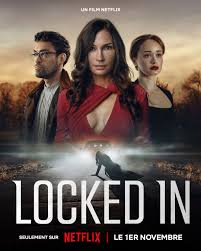
LOCKED IN
UK, 2023, 96 minutes, Colour.
Famke Janssen, Rose Williams, Alex Hassell, Finn Cole, Anna Friel.
Directed by Nour Wazzi.
This is something of a pastime movie, some audiences enjoying it is a psychological thriller, others very critical and dismissing it.
The screenplay is by Rowan Joffe (Brighton Rock).
This is a British production, a mansion, a sinister witch=like figure, an orphan seeming-heroine, a doctor. The title refers to a patient in hospital, Katherine, played by Famke Janssen, the matriarch of the mansion, coming out of coma, unable to communicate except by blinking, eventually indicating to the sympathetic nurse, Anna Friel, that she is the victim of a murder attempt. Visiting the hospital is Lena, Rose Williams, adopted daughter of Katherine.
Lena tells her story to the nurse, not always the truth. The action of the film moves back to Lena’s childhood in the situation at the mansion, Katherine and her stepson, always ill, and owning the mansion on the death of his father. The action also moves back three years to the wedding between the two young people and the further complications. Also in the action is the local GP, Dr Lawrence, who supervises the medication for the young epileptic.
As the plot develops, it seems moving towards a straightforward solution to the murder attempt – but, then there are so many twists, changing emotions, seeming betrayals, that it is difficult to know the authentic feelings of each of the three central characters. Some audiences enjoy trying to work this out – others gave up on it.
- The title, Katherine and her injuries, coma, physical and psychological condition? Main characters locked in the mansion? Jamie locked into his epileptic condition, staying in the mansion?
- The British thriller, psychological? Touch of the Gothic? Memories of Rebecca?
- The mansion, the grounds, the interiors, the river and the island, the hospital? The musical score
- The opening, Nurse Nicky, focus on her face and eyes, her interrogating Katherine, getting her to identify letters? Katherine, recovering from coma, her injuries, eye shut, fixed eye, linking? Returning to this sequence at the end?
- The screenplay, the present, going back 30 years, going back three years, the dramatic interplay of the time eras?
- Lena, at the hospital, with Nicky, concerns, fears, narrating the story?
- 13 years earlier, the situation, Katherine and Lena’s mother, friends, falling out, the mother’s death, Katherine becoming surrogate mother, her husband and his death, stepmother to Jamie? The past career, wanting a comeback, dressing up and going out, socialising?
- The issue of the inheritance, Jamie owning the house, Katherine in charge but not in charge, Lena and her age, devotion to Katherine, devotion to Jamie? His health, epileptic fits? And his ability to pretend to have fits?
- The flashback to 3 years earlier, the surprise of Jamie and Lena marrying, Katherine hovering like the traditional wicked witch, her speeches about the house, toasting, Jamie’s reaction, the dancing, his having a fit, carried out?
- The presence of Dr Lawrence, the prescriptions for Jamie, the discussions about the prescriptions? At the wedding? Jamie in the hospital, the encounter with Nurse Nicky and her criticisms, his reaction?
- Lena, the isolation, her journal, her thought about Katherine, the birthday sequence, the cake, Katherine’s reaction? Dr Lawrence’s presence? Lena and the attraction, her seduction, the sexual encounters? Indication of being willing to murder, Jamie and his wanting to have a picnic on the island, Dr Lawrence and his plan, going past the woodcutters, capsising the boat, dragging Jamie down? The police and satisfactory explanations?
- Lena and visits to the hospital, Katherine’s gradual recovery, the indication of murder?
- The seeming straightforwardness of the plot, the murder of Jamie, the murder of Katherine, the selling of the house, the money? Yet Lena and her protectiveness towards Jamie, the impact of his death, in the fascination with Dr Lawrence the future, her reactions to Katherine?
- The even further twists, audiences puzzled about Dr Lawrence, with Katherine, the seeming plan, with Lena, seeming double betrayals, the pursuit of Lena, Katherine saving her, not shooting, Dr Lawrence driving and hitting Katherine? The plan to take Katherine from the hospital, bring her home, the suggestion of poison?
- The setup, Katherine and her blinking, communicating with Lena, Dr Lawrence preparing the medication, Lena and decisions, injecting Dr Lawrence, stabbing Dr Lawrence, Nurse Nicky and her concern, the arrival of the police?
- The future, Lena owning the house because of Jamie’s death, with Katherine…?
Reckoning, The/ UK 2023
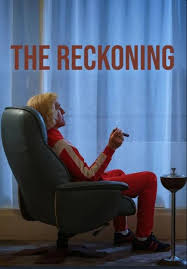
THE RECKONING
UK, 2023, 4 X 60 minutes, Colour.
Steve Coogan, Mark Stanley, Robert Emms, Gemma Jones, Neal Pearson, Siobhan Finneran, Mark Lewis Jones, Fenella Woolgar.
Directed by David Blair, Sandra Goldbacher.
The Reckoning is a strong television series, very difficult to watch. It is the story of the career of television personality, Jimmy Savile, and the revelation, a reckoning, of his abusive life.
The screenplay has been cowritten by Dan Davies, who had seen a television program of Jimmy Savile when he was young, followed through with his interest in Savile and seeming inconsistencies in his persona, eventually many interviews with Savile himself, finally writing an award winning account of several and his crimes.
From Wikipedia: “The boxes containing the many tapes, interview transcripts, newspaper cuttings and research articles that went into my book are taped shut and piled high in a shed. I don't want them in the house in which my three children live.
Davies' book In Plain Sight: The Life and Lies of Jimmy Savile was published in 2014. The book formed part of the basis of the BBC television series The Reckoning, and the series includes many scenes where Davies, played by Mark Stanley, interviews Savile.”
The sequences of interviews with Davies are a framework for the exploration of Savile’s life – and they are uncomfortable watching, Savile sociable, insinuating about his life yet in denial, needing to talk to Davies, the clashing, his calling him back.
With the flashbacks, there is information about Savile and his family, his referring to his mother as the Duchess (played by Gemma Jones), visiting her in Scarborough, grieved at her death, yet revering her as something of a saint. Then there are his early years in television, his eccentric manner, his way of talking, the friendly persona, on the BBC, Top of the Pops – and later his program as he travelled in his caravan interviewing people around the UK and his manoeuvring himself into the television program, Jimmy’ll Fix It.
It was courageous of Steve Coogan to take on the role but he has shown quite versatility in television programs and personas as Well Is in films. He is made up to look like Savile, perform like Savile. And the filmmakers have decided to include quite a range of sequences with the actual Jimmy Savile making Coogan’s performance all the more eerie.
The series is in four parts. By the second part, teenage enthusiasts are introduced, focusing on one girl in particular who is assaulted and commits suicide. While Savile is called before the authorities, he always has an answer and, despite rumours, succeeded in his covering his crimes until he died.
Each episode is framed by testimonies from actual survivors of Savile’s crimes. And, some of their stories are re-enacted, when they were children or young adults, making Samples double life, especially his travelling caravan, all the more sinister, accosting, especially young girls, and assaulting them with dire results.
But, unmarried, capitalising on his freedoms, over the decades he raised millions of pounds for hospitals, acclaimed by Margaret Thatcher who eventually gave him a knighthood (actress Fenella Woolgar doing an excellent impression of Margaret Thatcher), crazed affirmed by Diane, meeting with the Pope, John Paul II during his tour of Britain, a papal knighthood.
However, there were some who are suspicious, especially at the end, the series showing him hanging around hospitals, lurking in the morgue suspiciously, confronting nursing staff who push in the side.
With the revelations after his death, great disillusionment with the British public, to have feted him and believed him for Savile’s many decades, the discovery that he was an abuser, a predator, narcissistic, all show in stating he would put smiles on people’s faces, but interiorly, a loner, lonely, angry…
The series should be seen in conjunction with the BBC documentary, Jimmy Savile: A British Horror Story (2022).
Trigger Warning
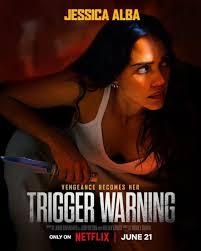
TRIGGER WARNING
US, 2024, 106 minutes, Colour.
Jessica Alba, Mark Webber, Anthony Michael Hall, Tone Bill, Jake Weary, Gabriel Basso.
Directed by Mouly Surya.
This is quite a standard action film, interestingly directed by Indonesian director, Mouly Surya (Murder in Four Acts).
It opens outside the United States, a terrorist episode, introducing Jessica Alba is a tough agent, enabling her to be the lead in an action film. She returns home at the death of her father, killed in a mine collapse. They are Hispanic family, looked down on by some of the local inhabitants.
In her investigations, she has to confront the local Senator, Anthony Michael Hall,. One son is the local sheriff (Mark Webber) the other is a thug, involved in stealing weapons from an Army Depot with a gang.
A lot of expected investigations, clashes, fights, revolution of the truth, the final confrontation in the minds and tunnels.
Familiar material, the variation for a star turn by Jessica Alba.
- Popular action thriller? Overseas action? Action in a small American town?
- The opening, CIA, surveillance, terrorists, the attack? Parker, talent in action, her partner killed? Working with Spider? Her return home?
- The town of Creation, small, the sheriff’s office, risen, the Sen’s mansion, the mine, the interiors, the arms depot, the tunnels? The musical score?
- Parker, her relationship with her father, the flashbacks, Hispanic and local reactions, the Hispanic community, her father, the mine, the collapse? Her investigation, discussions with the sheriff, an accident? Finding grenades? Her suspicions?
- Trapping Mike, feeding the lizard, their friendship? His mother, the continued help?
- Jesse, sheriff, the past relationship with Parker, some of the senator? The senator, the billboards, his conservative approach? Elvis, personality, his thug friends, the revolution of the stealing of the arms, selling them? The contact, Ghost? The deals, the threats, the deadlines?
- Parker, confrontations with Elvis, his gang? The fights, her skills? Discussions with the senator, the meal, Spider giving a warning, leaving, the confrontation?
- The buildup to a climax, Spider and his arrival, the gang, attacked? Parker, the arms, the old man giving her the machete, getting the cooperation of Mike and his mother, Hispanic friends?
- The climax, the confrontations in the mine, the fights, the final fight with Elvis? The explosion, Spider and his being overwhelmed, rescued? Parker and the confrontation with the senator, with Jesse?
- Jesse, ambiguous, the relationship with Parker, the sexual encounter, the aftermath, the revelation of his participation in the scheme? The finale, Parker chasing him in the depot, the final tour, his killing himself, the explosion?
- The aftermath, renaming the County, new candidates, Parker with Spider at the service station, Mike and the phone call, the bar and its future?
Bricklayer, The
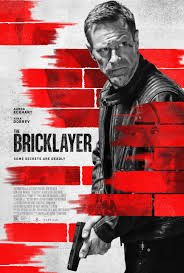
THE BRICKLAYER
US, 2023, 110 minutes, Colour.
Aaron Eckhart, Nina Dobrev, Clifton Collins Jr, Tim Blake Nelson, Oliver Trevino, Ilfenesh Hadera.
Directed by Renny Harlin.
This action thriller is based on the novel by former Marine and FBI agent for 20 years, Paul Lindsay, writing under the name of Noah Boyd. The screenplay has changed the agency from the FBI to the CIA.
Renny Harlin has made action thrillers for several decades, especially Die Hard 2. There is quite a mixed quality to his work. The action sequences are very strong – even though Aaron Eckhart is the hero, bricklayer, agent, is able to defeat all kinds of tough opponents, though in one sequence succumbing to just one of them! However, Eckhart is strong and tough in the role.
The villain is seen at the opening, Clifton Collins Jr, a disaffected agent, turning Road, wanting to expose the CIA and its many tentacles in Western cultures, secret assassinations…
The central character is a very prim, first, agent played by Nina Dobrev who accompanies the bricklayer to Greece where the action takes place. Quite a number of complications, assassination of journals, a political assassination attempt, a final confrontation between hero and villain despite a bonding in the past.
Tim Blake Nelson is the CIA boss.
More or less as expected.
- The title? The cover for the CIA agent? His explanation of his liking the work, precision, well fitting?
- The CIA, action throughout the world? Attitudes Western countries? Covert operations? Assassinations and targeting? Reactions?
- The realism of the screenplay? Or far-fetched?
- The opening, the journalist, Victor Radek, his purpose, her reporting, the photos and or sitter? Shooting her? The next journalist on the list? The group politician on the list? His making a case, disrepute of the CIA?
- The introduction to Steve Vail, Philadelphia, working on the building, the bricks, precision? Contact O’Malley? The meeting with Kate? The explanation of the situation? His decision to go to Greece, with Kate?
- The subtext of Miles Davis, music, records, the gift from Victor Radek, Tye with the collection of records, indication of her guilt?
- Kate, her CIA work, the office, re-examining the photos, discovering Radek?
- The flight, the interactions between the two, her self-importance, professional, his attitudes, Frieda? The arrival, posing as husband and wife, the hotel, the range of surveilance? Going to meet Patricio, his skills, the vehicle, IT and tech?
- She’s three, to the social, meeting with Tye, the past relationship, the discussions, her being bureau chief? The later encounters with her, at the apartment, the music?
- The attack on the journalist and the square, the protesters, Constantine and his speeches, Radek and his communication with Vail, motivations, memories, the death of his family? The decoy and Vail following, the shooting? The escape, the pursuit, talking with Radek?
- Vail and his visiting the club, the thug and his respectability, the fights? The credibility of Vail and his ability to conquer so many attackers? Yet in the office, his being overcome? The dangers for Kate, her involvement, with the vehicles? And the use of tracking devices?
- Vail, the memories and flashbacks with Radek, his family, his job is with the CIA, the promised to transfer his family, the Russians, the killing his family? Vail, the deal with Radek that he could disappear?
- The car chase, Radek’s escape, with the camera on the building, male or knocking it, the assassination attempt failing? Konstantin and his change of attitude, rescued by the CIA?
- Final confrontations, Radek’s death, the suspicions about O’Malley, the vast transfer of the bid calling? Vail and his suspicions, going to Tye, the confrontation, her death?
- The end, the interview with Kate and O’Malley, his being upset about suspicions, offer of promotion to Kate, her refusal? And Vail going back to his bricklaying?